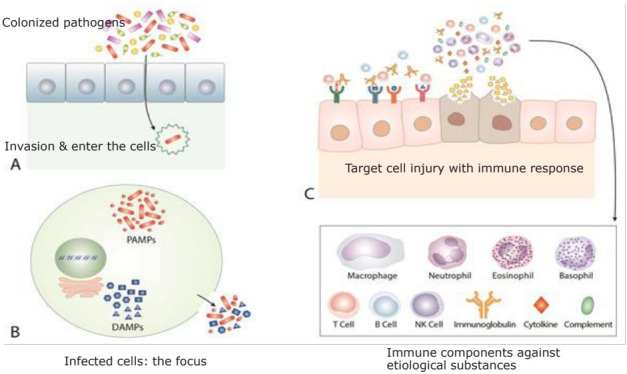Fig. 1.

A common pathogenesis of coronavirus disease, Kawasaki disease (KD), and multisystem inflammatory syndrome in children (MIS-C). On occasion, colonized severe acute respiratory syndrome coronavirus 2, KD agents, or MIS-C agents invade the host and enter the cells (A). During the incubation period, the pathogens replicate within cells and establish a focus elsewhere in the host. The focus of each disease contains not only pathogen-origin substances, including replicated pathogens, pathogen-associated molecular patterns, toxins and other byproducts of pathogens from the replication process, but also host cell-origin substances, including damage-associated molecular patterns, pathogenic proteins, pathogenic peptides, and other immune substances acting against invading pathogens such as interferons and immune peptides, which can be toxic to other host cells if realized (B). These substances can spread via the systemic or local circulation and bind to the target cells. The host’s immune system begins to act for control of these substances and initiates inflammation elsewhere at the target cells, and clinical symptoms and signs begin to appear. The abrupt spread of excess amounts of these substances induces cytokine storm, which are related to initially activated nonspecific adaptive immune cells and innate immune cells, and cytokine imbalance is responsible for the target cell injury. The subsequent substances derived from injured target cells or those produced during initial immune reactions induce further inflammation resulting in neighboring cell injury and secondary bacterial invasion (C). After the establishment of specific immune cells by the T-cell receptor and B-cell receptor recombination, the pathogenic proteins and peptides are effectively controlled, and inflammation ceases. The immune systems of some patients with coronavirus disease 2019 (COVID-19), KD, or MIS-C are unable to induce specific clones against pathogenic proteins or peptides derived from injured cells, thus, the ongoing activation of nonspecific adaptive immune cells and/or innate immune components is responsible for chronic immune-mediated diseases and complications.
